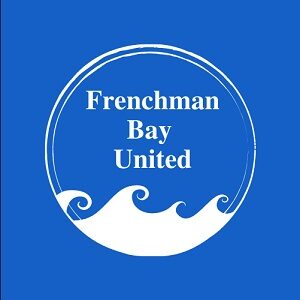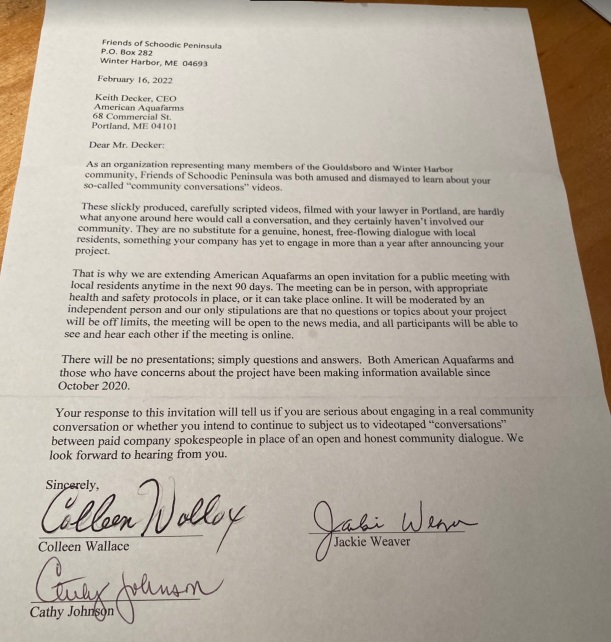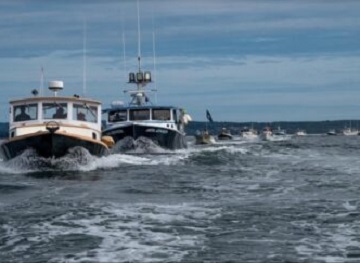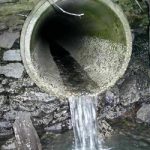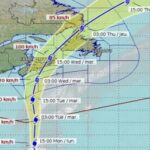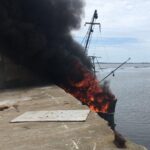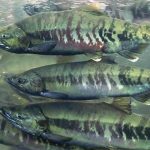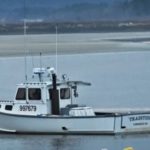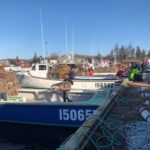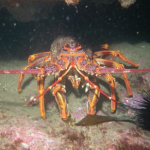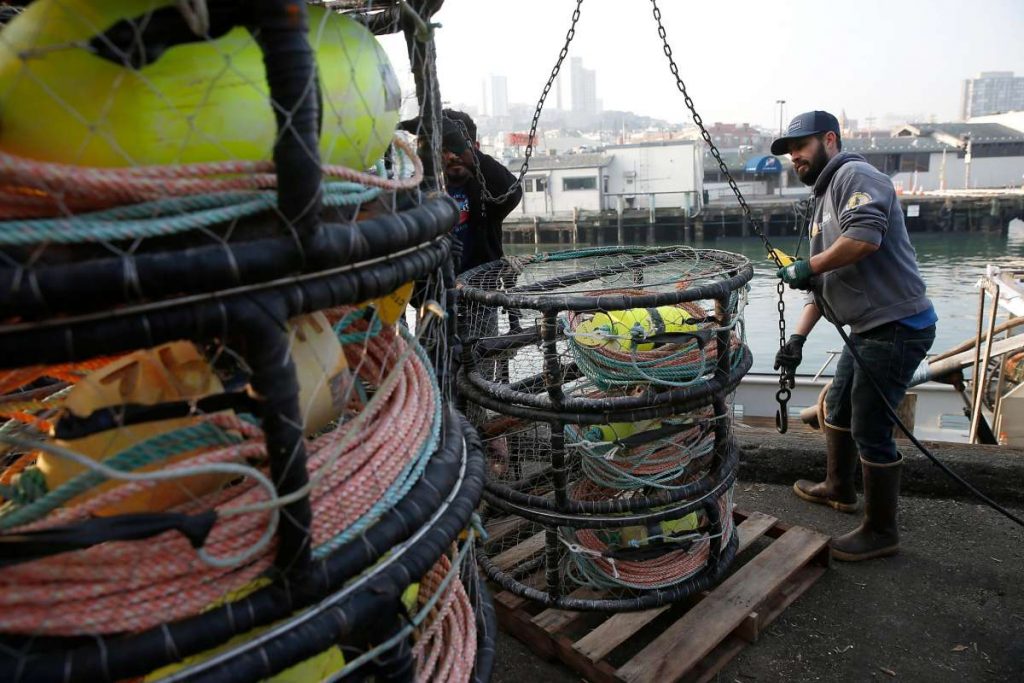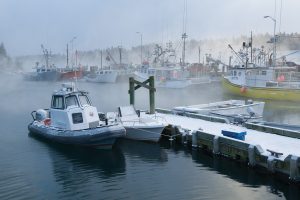Search Results for: American Aquafarms
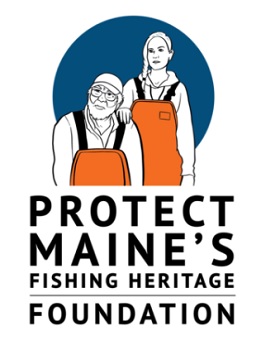
Maine Gubernatorial Candidates Publicly Oppose American Aquafarms Project
Earlier this month, Governor and gubernatorial candidate Janet Mills and former Governor and gubernatorial candidate Paul Lepage both indicated they do not support the American Aquafarms project which would have put 120 acres of net pen salmon at the foot of Acadia National Park. Republican candidate Paul LePage took to his Facebook page stating, “…I will oppose any future application from American Aquafarms in that location. The working ecosystem in Frenchman Bay is much too critical to place at risk for this proposed venture.” 2 press releases, >click to read< 15:16
Maine Gubernatorial Candidates Publicly Oppose American Aquafarms Project
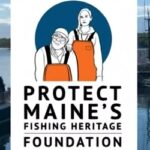 Portland, Maine – Earlier this month, Governor and gubernatorial candidate Janet Mills and former Governor and gubernatorial candidate Paul Lepage both indicated they do not support the American Aquafarms project which would have put 120 acres of net pen salmon at the footof Acadia National Park.
Portland, Maine – Earlier this month, Governor and gubernatorial candidate Janet Mills and former Governor and gubernatorial candidate Paul Lepage both indicated they do not support the American Aquafarms project which would have put 120 acres of net pen salmon at the footof Acadia National Park.
Republican candidate Paul LePage took to his Facebook page stating, “…I will oppose any future application from American Aquafarms in that location. The working ecosystem in Frenchman Bay is much too critical to place at risk for this proposed venture.”
Democratic candidate and current Governor Janet Mills, through her campaign in the trade magazine Intrafish stated, “The governor does not approve of American Aquafarm’s proposal.”
Mills in the past has refused to take a public position on the American Aquafarms project or other large scale industrial aquaculture projects.
The American Aquafarms project was nixed when the Norwegian company failed to find an acceptable source of smolts. While PMFHF was pleased to see the project stopped, the organization recognizes it would have likely moved forward if not for that technicality.
PMFHF executive director Crystal Canney said, “We are pleased to see the project that is potentially so detrimental to the environment get such wide attention in a governor’s race. Protect Maine urges both candidates to engage in planning along the Maines coast.” Canney added, “It’s not a secret that aquaculture leases are eating up the coast of Maine. We are hearing from individuals up and down the coast who are questioning why there is no planning for Maine’s coastline. Protect Maine again is asking Governor Mills to appoint a committee to look at this. We ask that the committee includes a broad range of stakeholders – not one that is limited to the historically biased group of powerful aquaculture lobbyists who have written the very rules and regulations that put a for sale sign on Maine’s coastline.”
Canney added, “Right now Maine’s rules are biased in favor of industrial aquaculture. Any individual, business, or corporation can hold up to 1,000 acres of the ocean for 20 years and transfer those leases to anyone in state, out of state and out of country without a public hearing. For an industry that has been promoted as being an opportunity for the lobstering industry to diversify, this has in fact hurt them. In addition, this also impacts small owner- operator aquaculturists as well. Protect Maine believes in the small owner-operator model, and we want Maine people to remain owners and not become farm hands.” PMFHF has introduced aquaculture moratoriums in multiple coastal communities which have been adopted. Communities have echoed the same sentiment – there is no planning for Maine’s Coast.
PMFHF is a founding member of Frenchman Bay United which has worked diligently to defeat the American Aquafarms project.
SALMON FARM OPPONENTS PLEASED BY SUPPORT OF MAJOR GUBERNATORIAL CANDIATES
For immediate release, August 15, 2022
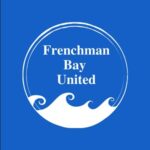 GOULDSBORO, Maine –Frenchman Bay United (FBU), the coalition that is leading the fight against a massive salmon farm proposed for waters next to Acadia National Park, is encouraged by public statements opposing the project from both major candidates for Maine governor.
GOULDSBORO, Maine –Frenchman Bay United (FBU), the coalition that is leading the fight against a massive salmon farm proposed for waters next to Acadia National Park, is encouraged by public statements opposing the project from both major candidates for Maine governor.
“After more than a year and a-half of hard work building strong, credible opposition to a proposal that will do irreparable harm to the environment and economy in and around Frenchman Bay, we are pleased to know that we will have the support of whichever candidate is elected governor in November,” said Henry Sharpe, FBU board president, adding: “There is much work still to be done to make sure that something like this is never allowed anywhere along the Maine coast.”
A recent article in industry publication IntraFish headlined Maine’s candidates for governor denounce American Aquafarms ahead of election quotes from former Republican governor Paul Lepage’s campaign Facebook page last month in which he stated: “…I will oppose any future application from American Aquafarms in that location. The working ecosystem in Frenchman Bay is much too critical to place at risk for this proposed venture.”
The article goes on to quote the campaign manager for incumbent Democrat Janet Mills, Alex Raposo, who told IntraFish that “The governor does not approve of American Aquafarm’s proposal and is pleased the Maine Department of Marine Resources independently rejected its application based on state law and scientific criteria.”
“There are many issues in this year’s race for governor, but this one is especially important to the people around the bay,” said Kathleen Rybarz, president of FBU coalition member Friends of Frenchman Bay and a select-board member in Lamoine, one of several towns around the bay that has gone on record against the American Aquafarms’ project. “Voters in Hancock County are likely to play a critical role in a close election, and we welcome the support of both major candidates in opposing a project that poses such a grave threat to the environment and economy of this area.
Rybarz noted that a public opinion survey conducted last spring by Oceana, an international ocean conservation group that opposes the American Aquafarms proposal, showed that 85% of voters in Hancock County said they were aware of the proposal to build a large-scale commercial fish farm in Frenchman Bay, and that 66% of county voters oppose the project after hearing arguments for and against it.
Last April, the Maine Department of Marine Resources (DMR) refused to accept American Aquafarms’ applications for leases on two sixty-acre site in Frenchman Bay because the company repeatedly failed to identity a qualified source of eggs under Maine law. The DMR action prompted the Maine Department of Environmental Protection to end consideration of the corresponding wastewater discharge applications the department was reviewing and return them to the applicant.
“If aquaculture is to be a driver to Maine’s economy, and the DMR and DEP are to uphold their respective roles in protecting marine resources and air and water quality,” said Sharpe, “the American Aquafarms proposal has clearly demonstrated that all stakeholders in Maine must work together to assure the continued abundance of our coastal resources for future generations.”
He added that “evidence shows these resources are in decline and under accelerating threats which are not being adequately addressed by our current regulatory framework. Maine’s next governor and legislature will have some important choices to make in terms of short-term thinking about benefits that accrue only to a few versus longer-term thinking about a sustainable and abundant future that benefits all Maine people.”
Sharpe said that time is of the essence because American Aquafarms has repeatedly stated that it intends to bring forward a new proposal, with company spokesperson Tom Brennan telling Maine Public last month that “it is absolutely our intention to pursue this again.”
News media contacts:
Ted O’Meara
Save the Bay
207-653-2392
Crystal Canney
Protect Maine’s Fishing Heritage Foundation
(207) 615-5968
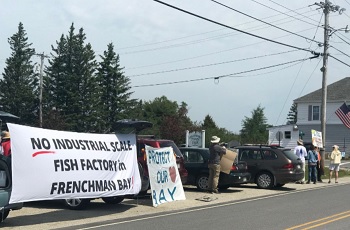
American Aquafarms appeals DMR lease application decision
American Aquafarms has appealed a recent decision by the Maine Department of Marine Resources to terminate two lease applications for a proposed salmon farm in Frenchman Bay. American Aquafarms (AAF) is asking the court to vacate the DMR’s decision and send the applications back to the department for continued consideration. The DMR, in a statement, said it stands behind its decision to terminate the lease applications. The reason for termination, according to the DMR, lies in the proposed egg stock that American Aquafarms had listed in its application. >click to read< 09:41
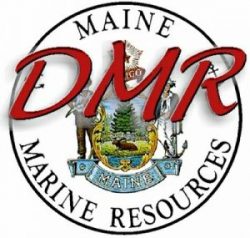
Notice of Lease Application Termination – American Aquafarms
The Maine Department of Marine Resources (DMR) has terminated the applications of American Aquafarms after the company failed to fulfill its legal obligation to demonstrate an available source of fish to be cultivated at its proposed salmon farms in Frenchman Bay. The source of Atlantic salmon proposed by American Aquafarms, AquaBounty of Newfoundland, Canada, did not meet the criteria for a “Qualified Source/Hatchery” as defined in DMR regulations (Chapter 24). Additionally, American Aquafarms failed to provide documentation demonstrating that the proposed source of fish/eggs could meet genetic requirements in law (§6071(4)). No further action will be taken on these applications. >link< 16:24
 FRENCHMAN BAY UNITED HAILS REJECTION OF AMERICAN AQUAFARMS APPLICATION – The coalition opposing the proposed industrial salmon farm says the fight will continue. “Commissioner Keliher made the right decision,” said Frenchman Bay United board president Henry Sharpe. “We hope that the company has finally gotten the message that they are not welcome here and that it’s time to pull the plug on this destructive and ill-conceived project once and for all.” >click to read<
FRENCHMAN BAY UNITED HAILS REJECTION OF AMERICAN AQUAFARMS APPLICATION – The coalition opposing the proposed industrial salmon farm says the fight will continue. “Commissioner Keliher made the right decision,” said Frenchman Bay United board president Henry Sharpe. “We hope that the company has finally gotten the message that they are not welcome here and that it’s time to pull the plug on this destructive and ill-conceived project once and for all.” >click to read<
FRENCHMAN BAY UNITED HAILS REJECTION OF AMERICAN AQUAFARMS APPLICATION
April 21, 2022
FRENCHMAN BAY UNITED HAILS REJECTION OF AMERICAN AQUAFARMS APPLICATION
The coalition opposing the proposed industrial salmon farm says the fight will continue.
GOULDSBORO, Maine – The group that for the past year has been leading the fight against a proposed industrial salmon farm near Acadia National Park hailed the Maine Department of Marine Resources’ decision yesterday to end consideration of the American Aquafarms’ lease applications for two sixty-acre sites in Frenchman Bay.
“Commissioner Keliher made the right decision,” said Frenchman Bay United board president Henry Sharpe. “We hope that the company has finally gotten the message that they are not welcome here and that it’s time to pull the plug on this destructive and ill-conceived project once and for all.”
The DMR Commissioner made the decision to kill the applications because American Aquafarms has repeatedly failed to supply the Department with the required information for a qualified source of fish eggs. The company can re-apply in the future if they resolve the issue, but according to Keliher they will be starting the process all over again, likely adding two or three years to the permitting process.
Sharpe cautioned that the DMR decision, while welcomed, was based on a technicality, not the merits of the project, and that FBU and other groups must continue to make the scientific and economic case against the project.
“It has been clear from the start that this project will create massive water and air pollution and will hurt the local economy through its adverse impacts on the lobster fishery, small-scale aquaculture operations already in the bay, and the many tourism and recreation jobs. All of these depend on a clean, unspoiled bay,” said FBU Treasurer Jeri Bowers, who is also president of Friends of Eastern Bay, a member of the Frenchman Bay United coalition.
“If the company decides to re-apply for leases at some point in the future, we will be more than ready to press our case that they do not comply with the other DMR lease criteria” she added.
Sharpe and Bowers noted that FBU also has presented detailed information to the Maine Department of Environmental Protection, which is considering American Aquafarms waste discharge applications. Modeling created by Dr. Chris Kincaid, a physical oceanographer at the University of Rhode Island Graduate School of Oceanography suggests that because the proposed farms would discharge of over 4.1 billion gallons of waste per day, large areas of the inner bay would exceed the regulatory threshold for nitrogen concentrations within just 60 days.
Marine biologists on FBU’s team suggest that these high nitrogen discharges, when added to a bay already showing high nitrogen concentrations, would be likely to kill eelgrass populations, advance eutrophication of the bay, and cause an increase in harmful algal blooms and neurotoxins known to cause Amnesic Shellfish Poisoning (ASP).
In addition to pushing for state agencies to deny permits for the project, an effort to strengthen local ordinances is underway in the town of Gouldsboro, within whose boundaries the pens would lie and where a proposed hatchery and fish processing plant is proposed for the village of Prospect Harbor.
After enacting a 180-day moratorium on large-scale aquaculture projects last fall, the town is pressing ahead with plans to enact a comprehensive set of ordinances that would regulate such operations on land and local waters. The moratorium is expected to be extended for another 180 days in a vote next week.
“Our town deserves a say in whether projects like this are in our best interest,” said Jackie Weaver of Friends of Schoodic Peninsula, another member of the FBU coalition. “Our lobstermen don’t want this and most people in town are dead set against it because of the pollution, the constant truck traffic it will generate, the strain on town resources like our groundwater, and the local jobs it threatens. In addition, the people behind this project have refused to meet with us, and we simply don’t trust them.”
“This proposal has been a wake-up call for all of us who live and work on the bay,” said Kathleen Rybarz, president of coalition member Friends of Frenchman Bay. “Regardless of what American Aquafarms decides to do next, we are continuing our efforts make sure that this project and any other like it never gets built in Frenchman Bay or anywhere else along the Maine coast.”
Rybarz, who is a member of the selectboard in Lamoine, said her town is also considering changes to its ordinances, that would give the town more say over large-scale aquaculture projects.
“Unfortunately, Maine’s existing rules and regulations have set the table for projects like this,” said Crystal Canney, executive director of Protect Maine’s Fishing Heritage Foundation, an FBU member. “We’ve allowed foreign investors like those behind American Aquafarms to think that Maine is a cheap and easy place to build something that wouldn’t even be allowed in their own country. We’ve got to change that, and hopefully the rejection of this project can be the start.”
Media contacts
Ted O’Meara
Frenchman Bay United
207-653-2392
[email protected]
Crystal Canney
Protect Maine’s Fishing Heritage Foundation
207-615-5968
[email protected]
Statement from Frenchman Bay United on Maine DEP’s return of American Aquafarms’ wastewater discharge applications
We are pleased that the Maine Department of Environmental Protection has returned American Aquafarms’ wastewater discharge applications to the company based on the Maine Department of Marine Resources’ decision earlier this week to end consideration of the company’s lease applications.
This means that American Aquafarms no longer has any permit applications under consideration in Maine for its industrial salmon farm. Based on the company’s failure to meet even the most basic criteria for consideration of its application, we are asking its investors to end the project completely.
Over the past year and a-half we have built a powerful and broad grassroots coalition against this project. We have developed modeling that demonstrates the devasting impacts of this project on Frenchman Bay and we have enlisted a diverse group of individuals and partner
organization to help us make the compelling case for denying the project. Our coalition continues to grow in size and strength.
While we applaud the decisions of the Maine DEP and DMR, if American Aquafarms unwisely decides to pursue this project further, we remain fully prepared to defeat it on its total lack of merit.
April 21, 2022
Elizabeth Ransom
Ransom Consulting, LLC
400 Commercial St., Suite 404
Portland, ME. 04101
[email protected] Sent via electronic mail
Delivery confirmation requested
RE: American Aquafarms Applications for Maine Pollutant Discharge Elimination System (MEPDES)
Permit and Maine Waste Discharge License (WDL) Applications
FB01 #ME0037567 / #W009242-6G-A-N
FB02 #ME0037575 / #W009243-6G-A-N
Return of MEPDES/WDL Applications
Dear Ms. Ransom:
The Department of Environmental Protection (Department) has received the letter dated April 19, 2022, from Department of Marine Resources (DMR) Commissioner Patrick Keliher. In this letter, the Commissioner states that, pursuant to Research and aquaculture leases, 12 M.R.S. § 6072(5) and
Aquaculture lease regulations, Ch. 2.08 (6)(D), no further action will be taken on the current aquaculture lease application submitted by American Aquafarms to DMR.
In response to this action by DMR, the Department is exercising its discretion to return the above listed applications for a Waste Discharge License accepted as complete for processing by the Department on June 9, 2021. See 06-096 C.M.R. Ch. 2, § 11(D) (“If the project requires a submerged lands lease from the State, evidence must be supplied that the lease has been issued, or that an application is pending.”).
If it submits a new application to DMR in the future, American Aquafarms may reapply to the Department for a Waste Discharge License.
If you have any questions regarding the matter, please feel free to call Cindy Dionne at 207-446-3820.
Sincerely,
Melanie Loyzim
Commissioner, Department of Environmental Protection
American Aquafarms
April 21, 2022
Page 2 of 2
ec: David Madore, Deputy Commissioner, MEDEP
Patrick Keliher, Commissioner, DMR
U.S. Army Corps of Engineers
Alex Rosenberg, USEPA
Anna Harris, USFWS
Brian Kavanah, MEDEP
Gregg Wood, MEDEP
Kevin Martin, MEDEP
Laura Jensen, AAG
Rob Mohlar, MEDEP
Angela Brewer, MEDEP
Henry Sharpe, Frenchman’s Bay United
David Kallin, Drummond Woodsum
American Aquafarms Interested Parties List
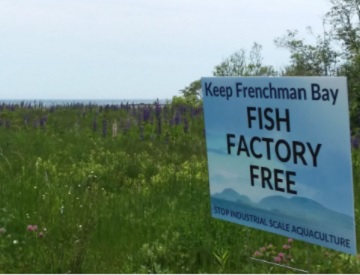
American Aquafarms salmon farm anxious to explain its vision. pssst, Eirik. No one wants it.
Officials representing a controversial salmon farm proposed for Frenchman Bay hope to meet with the public in the coming weeks to explain their vision amid vocal and visible opposition. Ten days ago, a flotilla of boats showed their opposition to the project in the water surrounding Acadia National Park. Company vice president Eirik Jors said American Aquafarms wants to open a U.S. location to help meet the growing demand for 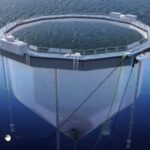 salmon. “The U.S. imports about 90% of its seafood,”,,, Save it, Eirik. National Park Service blasted the proposal in July., Other groups, including Protect Maine’s Fishing Heritage and Frenchman Bay United, are worried about the loss of fishing grounds for lobstermen and others. James West, a fourth-generation fisherman from Sorrento, said the lease site is too big and he’s worried about impacts on lobsters and fish. >click to read< 15:39
salmon. “The U.S. imports about 90% of its seafood,”,,, Save it, Eirik. National Park Service blasted the proposal in July., Other groups, including Protect Maine’s Fishing Heritage and Frenchman Bay United, are worried about the loss of fishing grounds for lobstermen and others. James West, a fourth-generation fisherman from Sorrento, said the lease site is too big and he’s worried about impacts on lobsters and fish. >click to read< 15:39
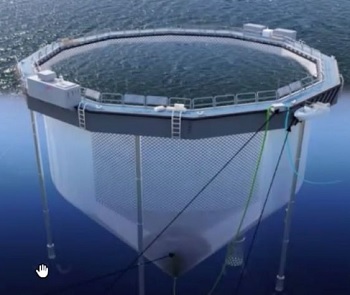
Lobstermen are opposed to this. Stopping American Aquafarms is your fight, too
The project will include 30 in-water fish pens, 150 feet in diameter; dozens of generators to power pumps and lights day and night; barges for feed and waste, and vessels ranging in size from 50 to 150 feet to process the fish and haul fish waste, fish food and thousands of gallons of diesel fuel. The threat to the bay’s waters and ecosystem from water pollution, fish escapes and disease is alarmingly real. Lobstermen who have fished these waters for generations also are opposed to this project. All 26 lobstermen who fish out of Bar Harbor presented a statement of opposition to the Town Council recently, and fishermen from around the bay are following suit. By Dennis Damon, >click to read< 11:19

“No Industrial Scale Fish Factory in Frenchman Bay” – American Aquafarms reps, critics take sides
Longtime South Gouldsboro lobsterman Frank Hammond has fished for decades in “The Hop,” an area northwest of Long Porcupine Island, where one of American Aquafarms’ sites would be located. He estimates about 15 to 20 lobstermen fish there from South Gouldsboro, Hancock, Sorrento and Lamoine. “I am dead against it. There is nothing to gain from this,” Hammond said at Saturday’s event. “The fishermen will never go for it if they’re going raise the fish in The Hop.” Another South Gouldsboro lobsterman, Jerry Potter, echoed Hammond. >click to read< 08:34

Maine: Fishermen oppose large salmon farm
Alley, Backman, Briggs, Coombs, Dunbar, Faulkingham, Knowles, Perry, Torrey and Whalen are among the surnames of multi-generation fishing families on the Schoodic Peninsula, whose working fishermen and women signed a petition opposing American Aquafarms’ proposed salmon farm comprising two 15-pen sites in Frenchman Bay. The 100 petitioners’ “Statement of Opposition” to the project to raise 66 million fish annually in their historic fishing grounds was delivered last week to the Gouldsboro Select Board. “This is going to take away more of our lobster fishing ground,” 75-year-old South Gouldsboro fisherman Jerry Potter said. Potter has fished in Frenchman Bay throughout his working life. “We’re worried about disease. And I’m very concerned it would pollute the bay and destroy the bay’s entire ecosystem.” >click to read< 13:26

Local Group invites Salmon Farm Developer to Engage in “Real Community Conversation”
Prospect Harbor, Maine – A local citizens’ group today delivered a letter to American Aquafarms inviting the company to participate in an open meeting to hear area residents ’concerns about the company’s proposal to build a massive industrial salmon farm in Frenchman Bay next to Acadia National Park. In their letter, Friends of Schoodic Peninsula called out the company for pledging months ago to meet with area residents but instead releasing a video recently of CEO Keith Decker and project manager Tom Brennan being interviewed by the company’s lawyer and calling it a “community conversation.” >click to read< 12:14
Local Group invites Salmon Farm Developer to Engage in “Real Community Conversation”
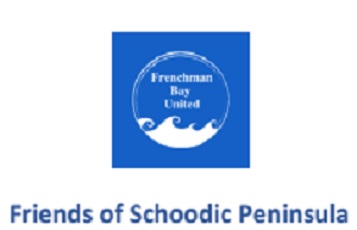 PROSPECT HARBOR, Maine – A local citizens’ group today delivered a letter to American Aquafarms inviting the company to participate in an open meeting to hear area residents ’concerns about the company’s proposal to build a massive industrial salmon farm in Frenchman Bay next to Acadia National Park.
PROSPECT HARBOR, Maine – A local citizens’ group today delivered a letter to American Aquafarms inviting the company to participate in an open meeting to hear area residents ’concerns about the company’s proposal to build a massive industrial salmon farm in Frenchman Bay next to Acadia National Park.
In their letter, Friends of Schoodic Peninsula called out the company for pledging months ago to meet with area residents but instead releasing a video recently of CEO Keith Decker and project manager Tom Brennan being interviewed by the company’s lawyer and calling it a “community
conversation.”
The group told Decker in its letter that “these slickly produced, carefully scripted videos, filmed with your lawyer in Portland, are hardly what anyone around here would call a conversation, and they certainly haven’t involved our community. They are no substitute for a genuine, honest, free-flowing dialogue with local residents, something your company has yet to engage in more than a year after announcing your project.”
Friends of Schoodic Peninsula co-founders Jacqueline Weaver, Colleen Wallace and Cathy Johnson said the meeting can happen any time within the next 90 days – either in person with appropriate COVID safety protocols in place or online and moderated by an independent party. In the past, American Aquafarms has held state-mandated Zoom sessions where they refused to show who from the public was attending and their lawyers decided who could ask questions.
The group told Decker in their letter that the company’s “response to this invitation will tell us if you are serious about engaging in a real community conversation.”
In addition to two 60-acre sites pen sites in Frenchman Bay, the proposed development would include a processing plant, hatchery, and sludge disposal operation on 11-acres in the village of Prospect Harbor, the site of a former sardine cannery and more recently a lobster processing
facility.
Friends of Schoodic Peninsula is part of the Frenchman Bay United coalition (www.frenchmanbayunited.org) that is leading the opposition to the proposed salmon farm.

Journalistic Failure: Calling them out for missing the real story
Your piece on American Aquafarms’ new propaganda videos reads like a company press release instead of a news story in a serious newspaper. For some reason the EA abandoned all journalistic principles and allowed American Aquafarms (which is neither American nor an operator of a single fish farm) to hype its massive, polluting, job-destroying fish farm scheme without any standard journalistic examination. There was no context, no questions, no investigation and no acknowledgement of the overwhelming grassroots opposition to the project. The “story” is such a lame love letter that it would be funny if the situation weren’t so tragic. By Jed West, Prospect Harbor >click to read< 10:31

4 years later, the 4 large fish farms planned for Maine haven’t started construction
This year will be remembered in Maine, at least in part, as when interest in developing four large-scale fish farms on the state’s eastern coastline continued to intensify. It also will be remembered by some as yet another year during which, nearly four years since plans for the first proposal were announced, none of the four separate projects began construction. The projects are at various stages of the permitting process, with some being fully approved and others not yet having any permits. All have shied away from announcing specific timetables for when they hope to start to build. Nordic Aquafarms, Kingfish Maine, American Aquafarms, and Whole Oceans, >click to read< 10:39

Frenchman Bay falsehoods
I am a lifelong fisherman of Frenchman Bay. I have fished the bay for over 50 years. I am familiar with the huge tides and winds that frequently occur here. American Aquafarms wants to put a 120-acre salmon farm in Frenchman Bay. American Aquafarms CEO Keith Decker says the company’s proposed 30 salmon pens will not affect those of us who fish in the bay. That shows either how little he knows, or wants to know, about the bay. Hard to tell. >click to read< By Jerry Potter, South Gouldsboro. Maine. To read more on American Aquafarms, >click here< 14:16
Anti-salmon farming activist Alexandra Morton to give special presentation for Mount Desert Island Biological Laboratory
World renowned author and anti-salmon farming activist Alexandra Morton to give special presentation for Mount Desert Island Biological Laboratory
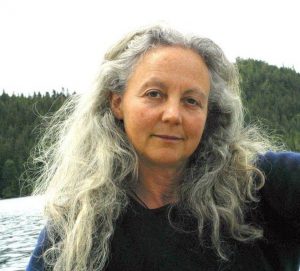 Nov. 29, 2021, (Bar Harbor, Maine) – Alexandra Morton has been called “the Jane Goodall of Canada” because of her passionate thirty-year fight to save British Columbia’s wild salmon from salmon farms. Her account of that fight is both inspiring and a roadmap for resistance to industrial-scale aquaculture.
Nov. 29, 2021, (Bar Harbor, Maine) – Alexandra Morton has been called “the Jane Goodall of Canada” because of her passionate thirty-year fight to save British Columbia’s wild salmon from salmon farms. Her account of that fight is both inspiring and a roadmap for resistance to industrial-scale aquaculture.
Morton has agreed to give a special lecture virtually from her home in British Columbia on December 06, 2021, at 5:00 p.m. (EST) as part of the MDIBL Science Café series. A question-and-answer session will follow.
“This important conversation comes at a critical time for Frenchman Bay and Maine as we face the rising challenge of industrial-scale aquaculture,” said Jeri Bowers, director of public affairs and development at MDIBL and treasurer of Frenchman Bay United, a coalition that is leading the fight against the American Aquafarms proposal. “We all can learn a lot from Alexandra Morton and her incredible fight against big aquaculture over the past 30 years.”
Morton’s work revolves specifically around salmon aquaculture and her efforts to preserve the pacific wild salmon. Her book, Not on my Watch, is warning of what could happen in Maine due to lax aquaculture rules and regulations.
Morton said, “I am pleased to be able to share my work with people who are facing the heavy fist of large industrial-scale aquaculture. This is not work for the faint of heart. Big aquaculture has the potential to devastate the natural fisheries and Maine people may want to protect their oceans and coastal waters before it’s too late. You have an incredibly valuable lobster industry and robust fishery – it deserves to be protected from those who are trying to profit from your waters.”
Frenchman Bay United, an umbrella organization representing five stakeholder groups – Protect Maine’s Fishing Heritage Foundation, Friends of Eastern Bay, Friends of Frenchman Bay, Friends of Schoodic Peninsula and Save the Bay – is partnering with the MDI Biological Laboratory to bring Morton’s story and lessons learned to Maine.
This event is free and open to the public, but attendees must register in advance. To register go to https://mdibl.org/event/
Crystal Canney
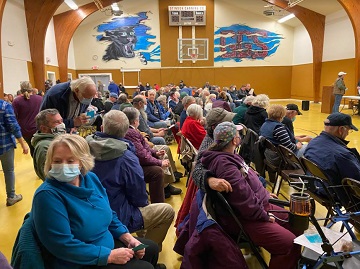
Overwhelming Majority Approve 6 Month Moratorium in Gouldsboro on Large Finfish Aquaculture Proposals
The moratorium gives the Planning Board time to shore up its ordinances to address projects as large as the 120-acre salmon farm proposed by American Aquafarms, which is largely made up of Norwegian investors. Veteran lobster fisherman Jerry Potter said that although this vote does not kill the project, it does send a strong message to the company that the majority of residents do not back the salmon farm project. American Aquafarms has said it needs the support of the community. “I have been opposed to this project since the first time I heard about it,” said Potter, 75, who has been fishing in Frenchman Bay since he was a teenager. >click to read< 11:59
Overwhelming Majority Approve 6 Month Moratorium in Gouldsboro on Large Finfish Aquaculture Proposals
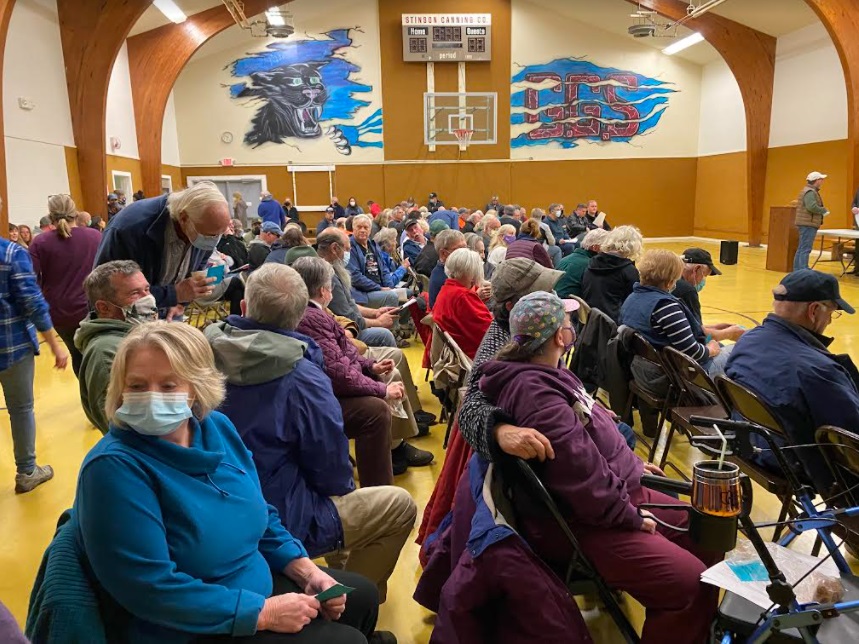 November 15, 2021 – In what is widely seen as a vote against a proposed industrial salmon farm in Frenchman Bay, voters at a Special Town Meeting Monday decided overwhelmingly to approve a moratorium against all large-scale fish farms for at least six months.
November 15, 2021 – In what is widely seen as a vote against a proposed industrial salmon farm in Frenchman Bay, voters at a Special Town Meeting Monday decided overwhelmingly to approve a moratorium against all large-scale fish farms for at least six months.
While there was not an exact count, Town Manager Eve Wilkinson said there were 205 people in the room and only 3 voted against the moratorium. It was so overwhelming with only 3 opposed that an official count was not taken.
The moratorium gives the Planning Board time to shore up its ordinances to address projects as large as the 120-acre salmon farm proposed by American Aquafarms, which is largely made up of Norwegian investors.
Veteran lobster fisherman Jerry Potter said that although this vote does not kill the project, it does send a strong message to the company that the majority of residents do not back the salmon farm project. American Aquafarms has said it needs the support of the community.
“I have been opposed to this project since the first time I heard about it,” said Potter, 75, who has been fishing in Frenchman Bay since he was a teenager. “We have a healthy economy in the bay and this will destroy that economy, all in order to line the pockets of overseas investors.” While many other commercial fishing and aquaculture activities take place within Frenchman Bay, and exist in harmony with Acadia National Park, this development is totally different. The scale, which is the equivalent of 16 football fields, is unprecedented in Maine.
Jacqueline Weaver, a founding member of Friends of Schoodic Peninsula and a board member of Frenchman Bay United, both of which oppose the AA proposal, said this project is wildly inappropriate development for the area and for Frenchman Bay.
“We didn’t ask for this, we don’t need it, and we don’t want it,” said Weaver. “The only people that will benefit from this are the investors. Existing businesses have great difficulty filling jobs. We need economic development that helps the area, not something that will ruin an irreplaceable ecosystem in Frenchman Bay.”
Opposition to the project has been growing locally since last spring when residents of the Schoodic Peninsula started becoming aware of the proposal and its magnitude.
While American Aquafarms is holding out the promise of new jobs, Acadia National Park, which would overlook the 30 pens, said the salmon farm would jeopardize 5,400 existing jobs that depend on the pristine nature of the national park.
The voting took place at the Gouldsboro Rec Center on Pond Road.
The moratorium ordinance addresses large scale aquaculture development and is retroactive to Sept. 16. The moratorium would freeze for six months the review and issuance of municipal permits for any finfish aquaculture-related development that comprises 10 acres or more in local coastal waters.
When the six month moratorium expires, the Gouldsboro Board of Selectmen would hold a public hearing on renewing the freeze for an additional 180 days.
In order to be granted the extension, the Planning Board would have to show that “reasonable progress” had been made to address issues posed by companies interested in starting a finfish aquaculture business within the town.
Contact: Jacqueline Weaver, Friends of Schoodic Peninsula, 207-546-0826
Crystal Canney Executive Director & Spokesperson
Protect Maine’s Fishing Heritage Foundation

Gouldsboro Special Town Meeting on instituting a moratorium halting all major finfish aquaculture projects
What: Gouldsboro Special Town Meeting on instituting a moratorium halting all major finfish aquaculture projects until related ordinances can be updated. Why: American Aquafarms is proposing to build a 120-acre salmon farm in Frenchman Bay and a hatchery, processing plant and sludge handling operation in the village of Prospect Harbor. When: Monday, Nov. 15, at 6 p.m. Where: Gouldsboro Rec Center, Pond Road. Contact: Jacqueline Weaver, Friends of Schoodic Peninsula, 207-546-0826 14:33

DEP officials hear opposition to salmon farm – “I am still shocked that we are talking about it”
The Maine Department of Environmental Protection’s will and capacity to adequately appraise American Aquafarms’ proposed plan to discharge a combined 4.1 billion gallons of diluted wastewater daily from both the Norwegian-backed company’s two 15-pen sites in Frenchman Bay were questioned during a 2.5-hour public meeting held online by the state agency Thursday night. The scientific studies and analysis underlying the industrial-scale project also were disputed and independent scientific data, which paints a different picture, submitted. “It’s just a big accident waiting to happen. I am still shocked that we are talking about it,” >click to read< 09:36
Proposed Industrial Salmon Farm near Acadia an Environmental and Economic Disaster for Maine
October 27, 2021
GOULDSBORO, Maine – Frenchman Bay United, the coalition leading the opposition to a proposal by Norwegian investors to build a massive salmon in Frenchman Bay next to Acadia National Park, today submitted extensive and detailed comments on the wastewater discharge applications now under consideration by the Maine Department of Environmental Protection (DEP).
“This project will be an environmental and economic disaster for Maine,” said Henry Sharpe, president of the group. “Thirty huge salmon pens will pump 4.1 billion gallons of untreated effluent into some of the most pristine waters on the Maine coast, and information submitted by the company about its wastewater discharge is grossly inaccurate and misleading.”
Sharpe said that his group’s submission to the DEP includes data and simulations from two independent experts. One model was developed by Dr. Chris Kincaid, a physical oceanographer from the URI-Graduate School of Oceanography Coastal Hydrodynamics Lab, while another model was developed by Dr. Lauren Ross, Assistant Professor of Civil & Environmental Engineering and Faculty Fellow at the Senator George J. Mitchell Center for Sustainability Solutions at the University Maine. Both models are full, 3D dynamic models able to predict transport of water and currents over time. Despite using different modeling platforms, both independently reached similar conclusions. Waste will not flush from the bay. Waste will concentrate due to gyre circulation patterns that move around each site, and between sites. Waste will be transported throughout the upper bay and deliver nutrients to shallower, ‘phototropic’ regions where they are likely to become ‘bioavailable’ to produce algal blooms.
Neither expert used Cormix, the model employed by the applicant, American Aquafarms, a model that Sharpe said is limited to only static, 2D, 15-minute snapshots that are not appropriate for showing waste dispersal in tidal waters where waste plumes recirculate.
Other issues raised by Frenchman Bay United in its submission to the Maine DEP include:
- The way the applicant describes how it will handle and treat fish waste means that they will be operating a solid waste facility on the water, and it should be regulated as such.
- Discharges into air and water from the two proposed pen sites interact, so they should all be considered as one consolidated application, not separate applications.
- The amount of nitrogen and phosphorus being discharged from the pens are provided as statements of fact, with no validation or data to support them despite the use of new untested and unproven technology. Excessive amounts of these nutrients can cause harm to plant and animal life.
- The applicant proposes to place 30 semi-closed pens in Frenchman Bay, but the trial of the only semi-closed pen in North America (in British Columbia), half the size of the pens proposed here and the first using such a pen to raise harvest-size fish, was recently halted after less than a year due to poor water quality and high fish mortality.
- There is no discussion about how to handle mass mortality events, and the associated discharge of viruses, pathogens, disease, and rotting fish like the die-off of more than 115,000 fish that occurred last August in a salmon farm off Bass Harbor that is 1/6th the size of the American Aquafarms proposal.
- The risk of discharge and contamination from 80,000 gallons of diesel fuel stored at the pen sites is not properly addressed and the spill plan is inadequate
In Frenchman Bay United’s formal comments to the DEP the group’s attorney, David Kallin, warned that American Aquafarms “is seeking to place this new technology in the middle of a coastal wetland of special significance in Maine’s coastal waters off the shore of a national park alongside one of the most recognizable jewels of the State of Maine. Should failure of any part of these systems occur, the impacts will not be contained to semi-closed grow pens, and will have a direct and devastating environmental impact to the low-flushing bay that is vital to Maine’s tourism industry and the ocean based economy of Mount Desert Island and surrounding communities.”
“For generations, Frenchman Bay has supported a healthy and sustainable balance of different commercial and recreational uses, but this project will upend all of that by allowing one group of foreign investors to overwhelm the bay with massive amounts of water, air, noise and light pollution,” Sharpe said. “A MEPDES permit must prove that the applicant will do no harm. This application fails that basic test. It makes statements that are unsupported, or that conflict with other analyses, and it is silent on many issues that warrant careful attention. The Maine DEP should deny the discharge permits the applicant is seeking.”
In addition to submitting written comments, Sharpe said many members of the Frenchman Bay United coalition and other project opponents spoke out at a public meeting the DEP held last night on the wastewater discharge applications.
Media contacts
Crystal Canney
Protect Maine’s Fishing Heritage Foundation
207-615-5968
Ted O’Meara
Frenchman Bay United
207-653-2392
Crystal Canney
Executive Director & Spokesperson
Protect Maine’s Fishing Heritage Foundation
207-615-5968
LEARN MORE:
Two More Towns Join Fight Against Industrial Salmon Farm Near Acadia
TWO MORE TOWNS JOIN FIGHT AGAINST INDUSTRIAL SALMON FARM NEAR ACADIA
More local organizations also add their voices to the opposition.
October 8, 2021
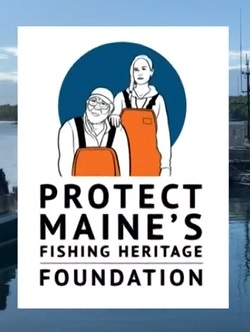 The select board of the town of Mount Desert Monday night voted to send a letter to Maine Governor Janet Mills stating their “vehement opposition” to the American Aquafarms’ project, an industrial salmon farm proposed by Norwegian investors for the waters of Frenchman Bay next to Acadia National Park.
The select board of the town of Mount Desert Monday night voted to send a letter to Maine Governor Janet Mills stating their “vehement opposition” to the American Aquafarms’ project, an industrial salmon farm proposed by Norwegian investors for the waters of Frenchman Bay next to Acadia National Park.
Saying that “such a massive project will forever change the intrinsic natural qualities that make Frenchman Bay a beloved national treasure and will threaten our local commercial fishery and the livelihoods of our citizens,” the letter calls on Maine’s Governor to use her “legal and moral authority to preserve and protect the marine life, clear cold waters and clean air of Frenchman Bay and adjacent waters for the current generation and for generations to come.”
Mount Desert joins the town of Sorrento, where residents voted at their annual town meeting last week to oppose the project and support the select board in seeking intervenor status in the Maine Department of Marine Resources (DMR) consideration of it. Both towns are following Bar Harbor, whose town council voted unanimously in June to seek intervenor status after receiving a petition against the proposal from local lobstermen.
“Momentum continues to build against this inappropriate and destructive project, and we expect more towns and local groups to join the opposition in the weeks ahead,” said Kathleen Rybarz, president of Friends of Frenchman Bay and member of Frenchman Bay United, a coalition of organizations and individuals that is leading the fight against salmon farm. “People in the communities around Frenchman Bay and Acadia National Park understand clearly that this project threatens local jobs in fishing and tourism as well as the natural environment and their quality of life.”
“This is no place for 30 massive salmon pens, using unproven technology and pumping 4.1 billion gallons of effluent into the bay each day while running huge diesel generators all day and night,” added Jacqueline Weaver of Friends of Schoodic Peninsula, another member of the Frenchman Bay United coalition.
In addition to Sorrento and Mount Desert, two local organizations also stepped forward in the past week to offer their opposition. In a letter to the Bangor Daily News, Joan E. Moore, president of Seaside Grange #567 in Corea, a village in the town of Gouldsboro where the American Aquafarms project would be located, stated:
We believe the large-scale fish farm and factory proposed for Gouldsboro is incompatible with the fabric and character of the Gouldsboro community, with the existing aquaculture in the bay and with the mission of Acadia National Park, whose land would be on two sides of the proposed fish pens. Potential damage to Frenchman Bay and the industries it supports could be devastating and irreversible. It could destroy the quality of life and livelihoods of people in the surrounding towns, and the impact on the health of the nearby islands and national park could be disastrous.
Additionally, the commodore committee of the Bass Harbor Yacht Club sent a letter to Frenchman Bay United last week noting that:
These are extremely active ‘home waters’ for the BHYC as well as countless unaffiliated recreational boaters, lobstermen, fishermen, seasonal tours all of whom enjoy the Bay’s unique marine habitat.
With the significant recreational and commercial activity in Frenchman Bay and the large coastal population on its perimeter – all within the shadow of a spectacular National Park – it is inconceivable that this is an appropriate area for commercial aquaculture.
“We welcome the support of additional towns and organizations in our efforts to stop this project,” said Rybarz. “We are building a powerful coalition against this project, and we hope that our elected officials and state regulators are getting the message that a project like this has no place in Maine’s coastal waters.”
# # #
Media contacts
Crystal Canney
Protect Maine’s Fishing Heritage Foundation
207-615-5968
Ted O’Meara
Frenchman Bay United
207-653-2392
Crystal Canney
Executive Director & Spokesperson
Protect Maine’s Fishing Heritage Foundation
207-615-5968
LEARN MORE:
Many Questions Unanswered Following DEP Statement on Fish Die Off at Black Island
 A Maine Department of Environmental Protection (DEP) statement on the massive of die-off of nearly 116,000 salmon at pen sites off Black Island in mid-August raises more questions than it answers, according to groups concerned about industrial-scale aquaculture in Maine waters. The die-offs were discovered at the Cooke aquaculture pen sites on August 16 and weren’t reported to the DEP for almost two weeks. In a news release today, the DEP said that it had found no permit violations associated with death of the fish.
A Maine Department of Environmental Protection (DEP) statement on the massive of die-off of nearly 116,000 salmon at pen sites off Black Island in mid-August raises more questions than it answers, according to groups concerned about industrial-scale aquaculture in Maine waters. The die-offs were discovered at the Cooke aquaculture pen sites on August 16 and weren’t reported to the DEP for almost two weeks. In a news release today, the DEP said that it had found no permit violations associated with death of the fish.
Protect Maine’s Fishing Heritage Executive Director Crystal Canney said, “So the obvious question is – what killed the fish? You won’t find answers in the statement issued today, and we are still waiting to hear from the Department of Marine Resources (DMR), the primary regulating agency on net pen salmon. DMR was very quick to say that it was a dissolved oxygen issue, but the DEP has already ruled that out in its statement today.”
Canney said that the lack of oversight by state government is appalling, especially given the very real environmental and public health concerns posed by the die-off. She said that her organization has already filed a Freedom of Access Act (FOAA) for notes and correspondence that went into the DEP arriving at its conclusions in this matter.
Cooke Aquaculture has been working under an old permit that was due for renewal in 2019. Under the current permit, testing for oxygen does not happen in the pens where the fish lived but rather 35 meters away from the site. Canney added, “That’s like having a problem with your woodstove filling your house with smoke, but then measuring air quality out in your yard. Maine’s inability to provide adequate regulation around net pen salmon couldn’t be clearer.”
“So, what caused the die-offs and are other species in any danger? If the pens were cleaned before the state arrived to look at them, where did all the fouling go, to the bottom of the ocean and what impact is that having on the fishing and lobster industry?”, Canney added.
“Foreign investors are currently seeking permission from the DEP and other agencies to put one of the world’s largest salmon farms in the waters off Acadia National Park,” said Ted O’Meara of Frenchman Bay United, a coalition that is actively working to stop the American Aquafarms proposal. “Massive die-offs are only one of many serious environmental threats, but the way this incident has been handled so far raises huge questions about the state’s ability to provide proper oversight of an in-water salmon farm that is far bigger than anything Maine has seen before. It looks like we are allowing large companies to call the shots while the public is being kept in the dark about what is happening in our own waters.”
Contact:
Crystal Canney
Executive Director
Protect Maine’s Fishing Heritage Foundation
207-615-5968
Ted O’Meara
Frenchman Bay United
207-653-2392
More than 125 boats participated in a “Save the Bay” flotilla today
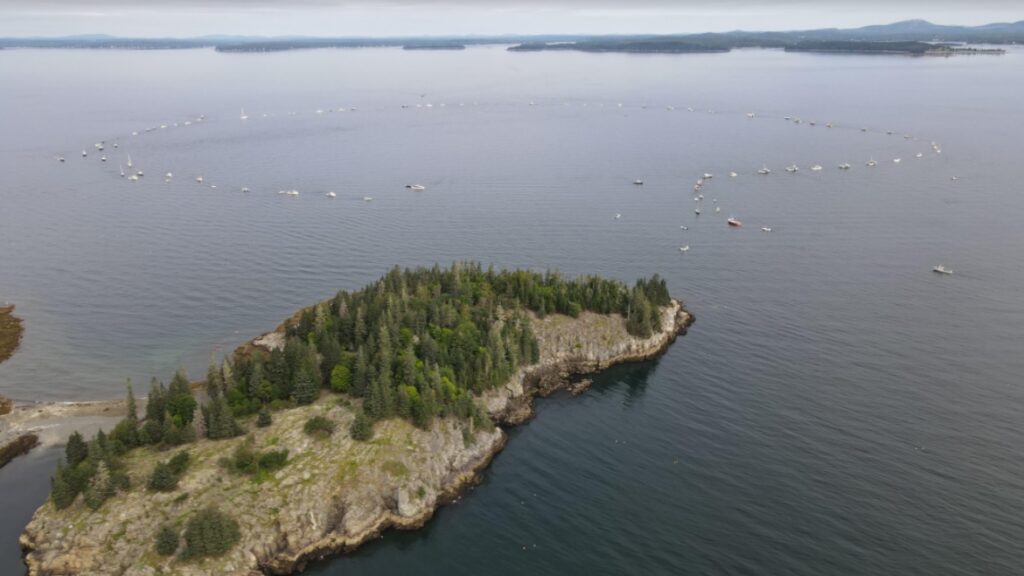 BAR HARBOR, Maine — More than 125 boats participated in a “Save the Bay” flotilla today to protest plans by American Aquafarms to place a massive industrial salmon farm in Frenchman Bay, just off Bar Harbor and Acadia National Park. The boat parade included many working lobster boats and a variety of pleasure craft. Organizers called the size of the boat parade unprecedented and said it demonstrates the depth of opposition to the salmon farm from people all around the bay. Courtesy Hewlitt Kent Drone shot
BAR HARBOR, Maine — More than 125 boats participated in a “Save the Bay” flotilla today to protest plans by American Aquafarms to place a massive industrial salmon farm in Frenchman Bay, just off Bar Harbor and Acadia National Park. The boat parade included many working lobster boats and a variety of pleasure craft. Organizers called the size of the boat parade unprecedented and said it demonstrates the depth of opposition to the salmon farm from people all around the bay. Courtesy Hewlitt Kent Drone shot Lobster boats and pleasure craft take part in a boat parade to protest plans for a massive industrial salmon farm in Frenchman Bay. Henry Sharpe, President Frenchman’s Bay United photo
Lobster boats and pleasure craft take part in a boat parade to protest plans for a massive industrial salmon farm in Frenchman Bay. Henry Sharpe, President Frenchman’s Bay United photo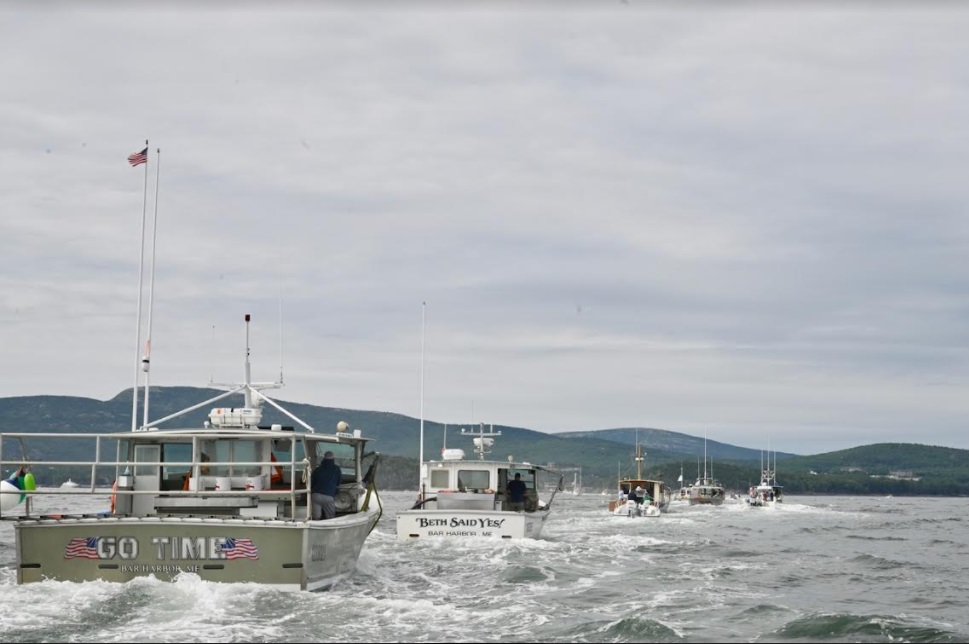 A long line of boats parade through Bar Harbor in protest of American Aquafarms’ proposal for an industrial salmon farm in Frenchman Bay. drone photo by Mike Perlman
A long line of boats parade through Bar Harbor in protest of American Aquafarms’ proposal for an industrial salmon farm in Frenchman Bay. drone photo by Mike Perlman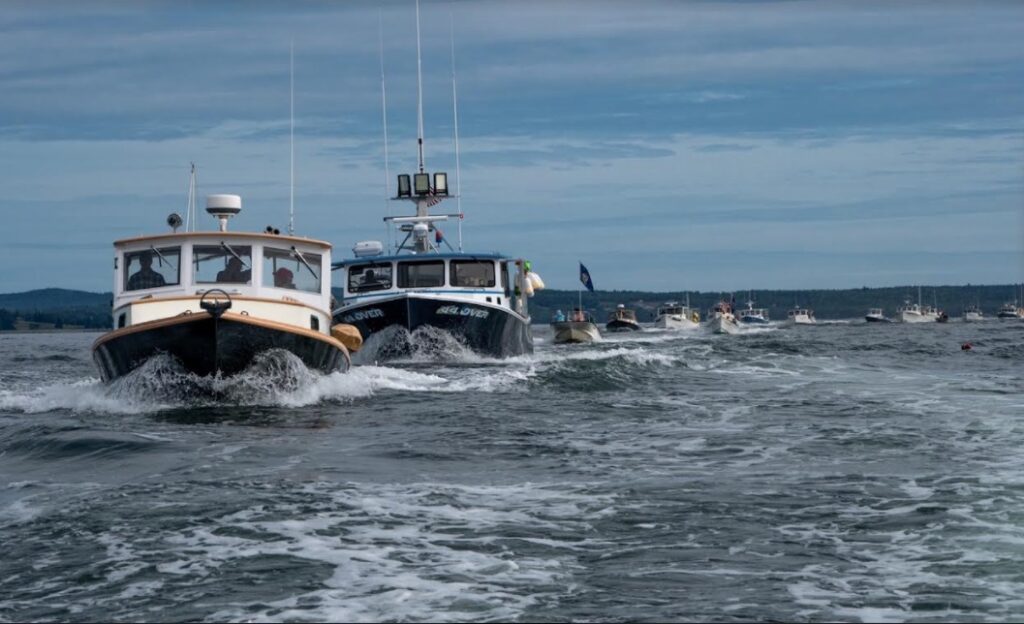 With Cadillac Mountain and Acadia National Park in the background, a procession of lobster boats and pleasure craft head towards Bar Harbor to protect a massive salmon proposed to Frenchman Bay. Ted O’Meara photo
With Cadillac Mountain and Acadia National Park in the background, a procession of lobster boats and pleasure craft head towards Bar Harbor to protect a massive salmon proposed to Frenchman Bay. Ted O’Meara photo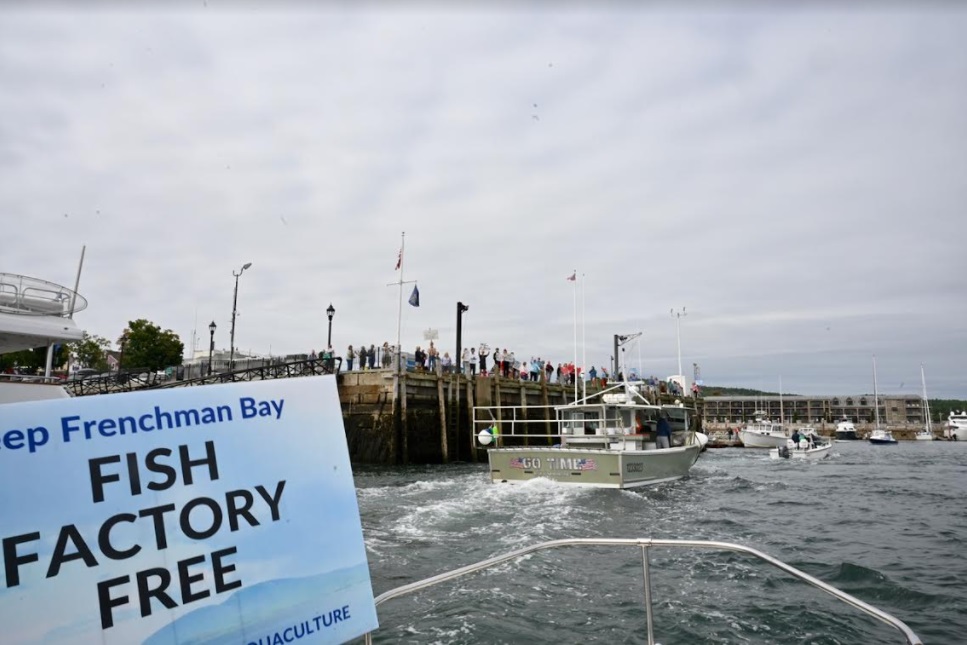 The 125-boat “Save the Bay” flotilla passed by the Bar Harbor town pier where more people holding signs against the fish farm were gathered. Ted O’Meara photo
The 125-boat “Save the Bay” flotilla passed by the Bar Harbor town pier where more people holding signs against the fish farm were gathered. Ted O’Meara photo

If the Frenchman Bay salmon farm isn’t right for Norway, it’s not right for Maine
About that American Aquafarms proposal: NIMBY- not in my backyard. In this case it applies to the developer, not the opponents. Whenever I describe to people the location of this industrial development in Frenchman Bay, their first reaction is always the same: What were they thinking? How could they possibly do this? The short answer is, the developers came here to do what they couldn’t do back home in Norway. They couldn’t build this project in their own backyard, so they are trying to put it in our front yard,, We’re better than this, and it’s time we stand up for all that is special about the Maine coast and say no. Not here. Not now. Not ever. >click to read< By Jerry Potter 10:55

Move Over! Industrial aquaculture/aquafarming has Maine lobstermen and fishermen hot under the collar
High-profile privately funded ventures have lately been converging on this corner of the North Atlantic. Norwegian owned American Aquafarms wants to salmon in Frenchman Bay, and other large Canadian and Dutch finfish aquaculture companies are moving into the region. This bustle, though, has raised the hackles of lobstermen and women represented by grassroots Protect Maine’s Fishing Heritage Foundation organization. They say large-scale aquaculture corporations are intent on “privatizing” the public ocean, in the process displacing locals who’ve fished these waters for years and endangering their livelihoods. They feel considerably less optimistic about the burst of interest in aquafarming in their local waters,,,>click to read< 09:07
Opponents of industrial salmon farm near Acadia National Park urge Interior Secretary Haaland to oppose project following her recent visit to Maine
For Immediate Release
June 30, 2021
Contact
Ted O’Meara, Save the Bay
207-653-2392
[email protected]
Crystal Canney – PMFHF
Protect Maine’s Fishing Heritage Foundation
207-653-1628
[email protected]
Opponents of industrial salmon farm near Acadia National Park urge Interior Secretary Haaland to oppose project following her recent visit to Maine
(GOULDSBORO, Maine) – Following a recent visit to the Schoodic section of Acadia National Park by Secretary of the Interior Deb Haaland, opponents of a massive industrial aquaculture project proposed for Prospect Harbor and nearby Frenchman Bay have sent a letter urging her to oppose the project or at least join with the many conservation groups and individuals who have already asked the U.S. Army Corps of Engineers (USACE) to conduct a full Environmental Impact Statement (EIS) on the project.
The USACE coordinates input from other federal agencies and is the only federal agency required to issue a permit for the proposed fish farm. An EIS is the most comprehensive and stringent environmental review that a project like this can undergo.
“We were proud to have Secretary Haaland visit our community,” said Jacqueline Weaver of Gouldsboro, who signed the letter on behalf of Friends of Schoodic Peninsula. “Now that she has seen for herself how inappropriate Frenchman Bay is for an industrial project like this, we hope that she will use her considerable influence in Washington to help us.”
The letter, signed by Weaver and representatives of several other groups that are members of the Frenchman Bay United coalition opposing the American Aquafarms development, tells Sec. Haaland, “We would welcome your opposition to this project, but at the very least we hope that you join the many land trusts, conservation groups, fishing communities, businesspeople and others who have requested that the U.S. Army Corps of Engineers, the only federal permitting authority for this project, conduct a comprehensive Environmental Impact Statement under the terms of the National Environmental Policy Act.”
The letter notes that the thirty 150’ diameter salmon pens proposed for the bay will displace those who fish for lobsters and other species in this area, threaten the bay’s ecosystem with billions of gallon of effluent from fish waste and feed, harm other small aquaculture operations that grow oysters, mussels and kelp, and disrupt life around the bay with the noise and air pollution from diesel generators that will run all day and night to power scores of pumps and lights.
It also references Haaland ‘s visit to Schoodic Point by noting that large ships carrying diesel fuel, fish food and fish waste will travel every day through some of the state’s most pristine waters off Schoodic Point on their way to and from the pens, destroying lobster gear along the way and disrupting the beauty and tranquility that we know you experienced there.
Secretary Haaland is the nation’s first Native American Cabinet member, and the letter references the ancestral ties of the Wabanaki people to the Acadia region and Frenchman Bay, quoting a 2014 article in the Friends of Acadia Journal that described Frenchman Bay as “a critical borderland of sorts in the complex relationships that developed between the Wabanaki, French, and English.”
Henry Sharpe of Sorrento, another signer of the letter and a design engineer who has worked with and taught oceanographers said that the groups are seeking Secretary Haaland’s assistance because current state rules and regulations are inadequate for consideration of a project of this scale and prevent many stakeholders around the bay from having a meaningful voice in the permit approval process.
“What we have seen so far from American Aquafarms is a complete lack of scientifically validated information to justify placing these experimental salmon pens in Frenchman Bay. No project using this technology has ever been attempted on such a large scale, and our research indicates that it would not even be allowed in American Aquafarms home country of Norway,” Sharpe said.
“Instead,” he added, “all of the evidence clearly demonstrates that this project will foul our waters with fish waste and effluent, create massive amount of air, noise and light pollution, and take jobs away from fishermen, small aquaculture farms, tourism-related businesses and many others whose livelihoods depend on a clean, unspoiled natural environment.”
A copy of the letter has also been sent to Governor Janet Mills and members of the Maine Congressional Delegation.
Groups Oppose Applications for Industrial Aquaculture Leases at the foot of Acadia National Park in Frenchman Bay
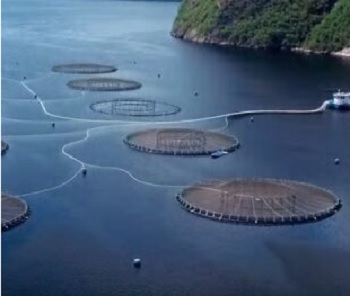 May 28, 2021 – Augusta, Me. American Aquafarms, a company led by a Norwegian businessman with a troubled financial past, has been accepted for consideration by the Department of Marine Resources for exclusive use with the state for 30 pens of in-water salmon aquaculture in Frenchman Bay adjacent to Acadia National Park. The application was immediately met with strong opposition from local lobstermen and women, and numerous groups opposing the project.
May 28, 2021 – Augusta, Me. American Aquafarms, a company led by a Norwegian businessman with a troubled financial past, has been accepted for consideration by the Department of Marine Resources for exclusive use with the state for 30 pens of in-water salmon aquaculture in Frenchman Bay adjacent to Acadia National Park. The application was immediately met with strong opposition from local lobstermen and women, and numerous groups opposing the project.
President of Friends of Frenchman Bay Kathleen Rybarz stated, “We are opposed to growing 30,000 metric tons of salmon annually, covering over 100 acres of Frenchman Bay. One cannot overstate the destructive impact of this large-scale proposal on a bay that already strives to balance multiple fisheries, heavy recreational use, cruise ship visitors and increasing ocean warming.”
“It is incredible that Frenchman Bay is even being considered for this kind of industrial development with massive fish pens in the waters right next to Acadia National Park,”said James Paterson, a year-round resident of Hancock and a member of a group calling itself Save The Bay. “This is simply the wrong place for acres and acres of large, unsightly sea pens, and we especially shouldn’t let the Maine coast be used as a Guinea pig for the unproven technology this applicant plans to use.”
“For generations, Frenchman Bay has supported a robust lobster fishery, small-scale aquaculture like oyster, mussel, and kelp farming, and a host of tourism and recreational activities, Paterson added. All the things that make this bay special to Maine people and visitors from around the world and all the people whose livelihoods depend on a clean, healthy bay are threatened by this ill-conceived proposal. The State of Maine needs to say no.”
“For me there is something primal about the peace over the bay that no doubt will be shattered by the incessant, jarring, generator din, driving the pumping of nutrient enriched effluent out from the pens into Frenchman Bay on an industrial scale,” said Ben Walter, a member of Friends of Schoodic Peninsula. “The health of the bay’s ecosystem hangs in the balance, and with it the livelihoods of those who have sustainably worked the bay for generations. I feel this proposed development is a threat to the health and very fabric of our community that share and enjoy this magnificent resource in harmony with nature and one another.”
The pens in Frenchman Bay would grow 66 million pounds of farmed raised salmon and compete with lobstermen who have also expressed their concerns. Protect Maine’s Fishing Heritage Foundation (PMFHF) Executive Director Crystal Canney said, “There are many things wrong with this project, especially as it relates to the deleterious effects it may have on the environment. On a statewide level, these conflicts continue to grow. PMFHF has heard from more than 30 lobstermen who fish in Frenchman Bay. They are concerned about the loss of bottom but also concerned that the rules and regulations at the Department of Marine Resources are risking the livelihood of a $1.6 billion industry.”
“We are deeply concerned about the growing number of industrial-scale aquaculture lease applications in Frenchman’s Bay. The scale of the Norwegian-based American Aquafarms fin fish application threatens to destroy not only the pristine beauty of Frenchman Bay and Acadia National Park, but also the heritage fishing industries that have been part of our way of life for more than 200 years,” said Jerilyn Bowers, a member of the Friends of Eastern Bay. “If you live, work or recreate on Frenchman Bay, this is an issue you should care about.”
The leader of the company behind this project was convicted of defrauding investors in Norway. Though not currently in the scope of criteria of the Department of Marine Resources’ for considering an aquaculture lease, the character and credibility of anyone seeking to gain exclusive rights to Maine waters certainly should be taken into account to protect Maine people and the names of all current and future investors in this project should be disclosed immediately.
Link to leases: https://www.maine.gov/dmr/aquaculture/leases/draftstandardapps.html
Crystal Canney
CEO, The Knight Canney Group
Podcast Host: North By Northeast
207.615.5968






